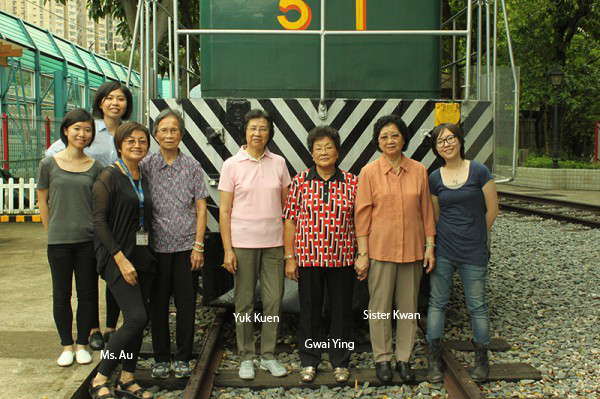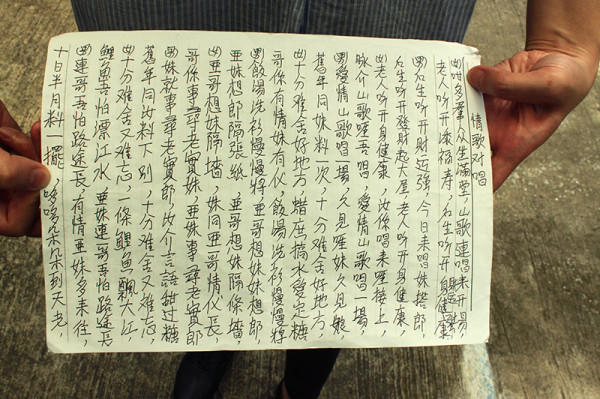Listen 來聽
The Elderly Singing Group II 長者山歌聚會(二)
Listen 來聽 / Meanderings - Feature Story 咫尺 - 專題故事 / Feature: Where is the song? 哪裡有歌?
Interview 採訪:The Library/ 聲音圖書館
Transcription 謄錄: Emma Wu/ 吳嘉曈
Editing 編輯、整理: Law Yuk-mui/ 羅玉梅10:00AM-12:00NN, 07/15/2013
Tai Po Salvation Army Community Centre/ 大埔的救世軍社區中心
Hong Kong Railway Museum /香港鐵路博物館Tascam DR 40/ Handheld 手持錄音/ Recorder mounted on tripod 錄音機置於三腳架
boy, Elderly, girl, Hakka, rice dumpling, shange, 客家, 山歌, 邂逅, 長者, 鹹肉粽

Ms. Au: Founder of the Hakka shange 山歌 (mountain song) gathering; has served at the Tai Po Salvation Army Community Centre for nearly 20 years; her husband is Hakka.
Sister Kwan: In her 70s; grew up in Tai Po; learned how to read through singing shange.
Gwai Ying: a New Territories native in her 70s; can read and write.
Yuk Kuen: In her 70s; best buds with Gwai Ying; always sings “Love Duet” with Gwai Ying every time she attends.
Uncle Sing Wong: In his 90s; has been in Hong Kong for some 50 to 60 years; encouraged by his family, he takes part in the Hakka shange gathering.
Boy meets Girl
Ms. Au: We have been organizing Hakka shange gathering here at our centre for nearly 20 years now. I’m really glad that old friends continue to join us, allowing our Hakka shange to live on. Now, due to the limits of space, the scale has shrunk. At its largest, in one of the halls of the community centre downstairs, there were almost one or two hundred people. It was full of people every weekend; it was so very happy! Now, because the room has gotten smaller, there are only 60 to 70 people left.
It was really fun in the hall. Many grannies and gramps in wheelchairs came. Some of the grannies didn’t know how to read, but they had a lot of fun listening to the contents in the Hakka shange. The Hakka shange express some unhappy emotions while they were growing up—like the feelings of hardship while growing up as a daughter or as a daughter-in-law. Some other content would include impromptu current events or jokes, or some love songs between boys and girls. There are also riddles, word games—full of variety.
The Library: Did you start singing Hakka shange from a young age?
Sister Kwan: No, I didn’t. I would listen to others sing, to the herders, for instance. Later, I stopped farming, so when I sold vegetables, I would go and listen to people singing Hakka shange for a bit. Back then that Lee Lin-pak sang at the singing group; I knew a few songs and would go in and sing. He told me, “Not bad! You have a clear voice!” Lee Lin-pak came frequently, selling his tapes—10 dollars a cassette. I would buy and listen at the bedside all the time. And then later I came and sang myself.
Uncle Sing Wong: I started in my 20s. Back then, I didn’t know how to sing. I learned while singing.
Gwai Ying: I was 7, 8…almost 10 years old. I would lead the cattle and pass some villages. The boys would see a group of girls and would sing to tease us. Then we would tease them back. They would say we weren’t nice, and then we would tell them they weren’t nice either.
Ms. Au: Hakka shange really tests your impromptu reactions. Like what Gwai Ying just said, if you say I’m no good, then I would immediately have to think of some lyrics to answer you back.
Gwai Ying: Yes, he said no one liked me, so then I said you weren’t so great either, no wife for years. But then, the day before yesterday at Sha Tau Kok, I saw the man I argued with in the Hakka shange. He grabbed my hand and said, wasn’t it so great to talk about love back then? And you disliked me for talking too much!
Everyone: Haha! Looks like fate!
Gwai Ying: Yes, he asked me if I was the one who sang the Hakka shange. So I said, yes, I was the one who chewed you out in the Hakka shange. Then he said, that’s right. Now I don’t sing any more. I said I still sang these days. Then he said, if I’d known, I should have gone after you! I said, back then, you disliked me for being fat—for looking dumpy like a big rice dumpling with salty pork!
Sister Kwan: Let me sing one for you!
A boy teases a girl…(singing)…why haven’t you married, still without a husband? And then the girl answers back…(singing)…then said, you say I have no husband, then I say where’s your wife? All these years, and you still haven’t found a wife!
Ms. Au: They often take advantage of the improvised environment and say things right out. But sometimes, the content can be quite literary. For example, a stalk of spring onion [tsung] hung with lanterns….
Gwai Ying: That’s pine [tsung], pine trees, those things on top of mountains.
Ms. Au: Ha, they’re pines! I always thought it was spring onion. Haha! I won’t say anything more!
Sister Kwan: Back in those days, herding the cattle, there’d be grass on the mountain. On the mountain would be pine trees, and you can shade yourself under them. A boy seeing a girl would tease her and say, why don’t you have a husband. The girl would get mad hearing this, and talk right back about how he still had no wife.
Gwai Ying: Every girl from the village would wear black clothes, and there were no shoes to wear. He would be picky and say I’m thirty something already and still not married, and I’d become an old nun. I got mad, saying he was an old kid at 32, with a beard now and still without a wife, and still saying I’m an old nun! He got so mad he couldn’t even talk.
Sister Kwan: Some also say, I’m too good to enter your house…(singing)…No matter how old I get every day, I won’t marry you, I won’t even enter your house.
Ms. Au: Their lyrics are beautiful. Even though you might feel the Hakka are a bit rough as a group, you can still see many meaningful things in the Hakka shange lyrics. For instance, they just sang about how the carp and the perch swim back and forth at the bottom of the water, secretly going back and forth, without anyone seeing. This talks about how boys and girls secretly go on dates and not let anyone know.
Sister Kwan: Wouldn’t dare! In the past, you weren’t allowed to date.
Ms. Au: Great! It’s a little cramped here, so let’s go over there by the railway museum. I think it’s a bit closer to nature there, and everyone would sing a bit more naturally—and perhaps it would help everyone remember the lyrics!
My Favorite Songs
The Library: After arriving at the Hong Kong Railway Museum, Yuk Kuen came, and everyone sang their favorites songs. Though occasionally needing some lyrics to help with their memories, everyone sang two or three songs, not even running out of breath.
Uncle Sing Wong singing “Wisdom form Chinese Proverbs”
Uncle Sing Wong singing “New Moon”
Sister Kwan singing “Sending the Husband Away”
Sister Kwan singing “Tai Po is Great”
Sister Kwan singing “New Year Flowers, Bloom Eternal”
The Library: After marriage, Hakka women rarely sang love songs with the opposite sex, and rarely will men actively ask to sing love songs with women. These “Love Duet” are actually sung between women.
Gwai Ying and Yuk Kuen singing “Finding Partners through shange”
Gwai Ying and Yuk Kuen singing “Love Duet”
歐姑娘: 客家山歌聚會的創辦人,在大埔的救世軍社區中心服務近二十年,丈夫是客家人。
群姐: 七十多歳,大埔長大,靠唱山歌而識字。
桂英: 七十多歲新界原區民,懂看字﹑寫字。
玉娟: 七十多歲,桂英死黨,每次出來都是與桂英對唱情歌。
城隍叔: 九十多歲,來香港五、六十年,因為家人鼓勵而參加山歌聚會的。
邂逅
歐姑娘:我們中心的客家山歌也舉辦了將近二十年了,很開心不斷有老友記加入,讓我們的山歌可以一直流傳下來。現在呢,因為地方的局限,所以我們就把規模縮小了。規模最大的時候,在樓下社區中心的一個禮堂裡,也有差不多一兩百人,每個週末都很熱鬧、很開心。現在因為房間變小了,所以就剩下六﹑七十人左右。
以前在禮堂很開心的,很多坐輪椅的婆婆和伯伯都來。有一些婆婆不識字,但是他們聽到客家山歌的內容也是很開心的。客家山歌裏面能講出來他們成長中一些不開心的感受,比如說當女兒的,或者當兒媳婦的艱苦成長的感受。也有一些內容是即興的時事或者笑話,也有一些是男孩女孩對唱的情歌。也有猜謎語、字索這些,有很多花樣的。
聲音圖書館:是不是小時候就開始唱山歌了?
群姐:沒有唱的。都是聽別人唱的,聽放牛那些人唱。後來沒有種田了,就在賣菜的時候,聽到有人唱山歌,我就去聽一下。以前那個李連白在救世軍唱,我就會幾首,進去唱;他說,不錯啊,你聲音很清喔! 他常常來,賣錄音帶,十塊一盒,我就買來放在床頭聽。一直聽,後來就出來唱了。
城隍叔:我是二十幾歲開始的。那時候不會唱,就邊學邊唱咯。
桂英:我就七、八、差不多十歲咯。我十歲掌牛,經過一些村子,男孩見到是一群女孩子,就唱歌逗我們,我們就逗回去。他們說我們不好,我們就說你們也不好。
歐姑娘:客家山歌真的很考驗即興反應。像剛剛桂英說的,你說我不好,我就要馬上想一些詞來反駁你。
桂英: 對啊,他說我沒人愛,我就說,你也很糟糕,幾十歲了都沒老婆。不過呢,我前日在沙頭角,見到跟我頂山歌那個人!他抓住我的手說,以前說愛你不就挺好嗎,那時候你又嫌我多嘴!
大家:哈哈,好有緣分啊!
桂英: 是啊,他問我是不是以前唱山歌那一個,我說對啊以前唱山歌罵你是壞人的那個。他說是啊,我現在不會唱了。我說我現在還會唱。他還說,早知道那時候追你就好了!我說,那當時又嫌棄我胖,嫌棄我像隻鹹肉粽!
群姐: 我現在唱給你聽吧!
一個男孩子逗一個女孩子,……(唱歌)……你怎麼還沒嫁出去,還沒有老公呢?然後女孩子又反駁回去,……(唱歌)……就是說,你說我沒老公,我 就說你沒老婆,你年紀都這麼大了都還沒討到老婆!
歐姑娘:他們常常利用一些即興的環境,直接用嘴巴說出來,不過有時候內容也很文雅的。比如說,用一棵蔥,一棵蔥全部吊燈籠……
桂英: 是「松」啊,松樹啊,山頂那些。
歐姑娘: 哈,是松樹啊?我還以為是一棵蔥,哈哈,我不說話了!
群姐: 以前掌牛,草是長在山上的嘛。山上有松樹,松樹底下可以遮陰,男孩看見女孩就會逗她,說你怎麼沒老公,女孩聽了以後就很生氣,就反駁他,說你這麼大了不也沒有老婆。
桂英:每個鄉下妹,穿個黑衣服,還沒有鞋子穿,他就挑釁,說我三十多歲都沒嫁就變成老尼姑了。我很生氣,說他三十二歲老後生,鬍子剃完又長出來了都還沒娶到老婆,還說我是老尼姑,氣得他說不出話了。
群姐: 也有說,我這麼好,不會進你家,……(唱歌)……我天天老,也不會嫁給你,進你家。
歐姑娘:他們的歌詞是很美的。雖然說,感覺客家是一個比較粗野一點的群體,可是你看客家山歌的歌詞,很多都是很有意思、很優美的。比如說,剛剛有唱到,鯉魚和鯽魚都是在水底游來遊去,暗中往來,沒有人看到,就是說男女偷偷拍拖,不讓別人知道。
群姐: 不敢的啊,以前不給拍拖的。
歐姑娘: 好!這個環境比較局促,我們去鐵路博物館那邊吧!我想那邊的環境比較接近大自然,大家唱起來的氣也順一點,也可能會幫大家多想起來一些歌詞。
我的歌
聲音圖書館:到香港鐵路博物館後,玉娟來了,大家都拿自己最喜愛的歌來唱。雖然偶爾需要借助歌詞來幫助記憶,但每人連唱兩、三首,氣一點也不喘。
城隍叔唱《增廣賢文》
城隍叔唱《月朔》
群姐唱《送郎過埠》
群姐唱《大埔好》
群姐唱《正月頭花開萬年》
聲音圖書館:客家婦女婚後很少與異性進行情歌對唱,也很少男性會主動約女性對唱情歌,所謂的情歌其實是「女女」對唱。
桂英、玉娟對唱 山歌找對像
桂英、玉娟 情歌對唱

Hong Kong Railway Museum/ 鐵路博物館

Uncle Sing Wong/ 城隍叔

Sister Kwan/ 群姐

“Tai Po is Great” lyrics/ 《大埔好》 歌詞

Gwai Ying and Yuk Kuen/ 桂英、玉娟

“Love Duet” lyrics/ 《情歌對唱》歌詞

Lam Chun’s self publishing Hakka shange book/ 藍叔 編印山歌歌書